Guest Blogger J.M. Levi is half-Samoan or afatasi and grew up in Missouri. We are pleased to feature her thoughts on Toa-o-Samoa – Samoans who serve in the military in honor of Memorial Day.
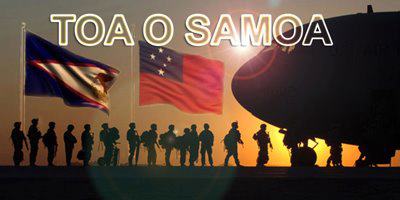
Warriors of Samoa
In 1872, Samoa agreed to allow the United States of America to build naval bases at Pago Pago, Tutuila in return for Military protection. (American Samoa became a Territory of the United States in 1900.) Later, during World War II, males 14 years and older trained for the opportunity to serve in the US Armed Forces. My grandpa, Atonio Fuimaono, served in WWII and was stationed at Wake Island in Hawai’i on the island of O’ahu.
Although my grandpa did not die during his time of service, I still find myself thinking about him as Memorial Day approaches. Memorial Day is a day set aside to remember and honor those who died while serving in the United States Armed Forces; whereas, Veteran’s Day is the day set aside to remember all Veterans.
My grandpa died a veteran. He was able to come home and continue his life. But, I find myself wondering how he came to serve—was it something his parents put him up to or did he enlist on his own accord? And what if he had died while serving? Would he have been surrounded by friends and loved ones as he was when he passed away at home? Or would he have been in a strange land surrounded by strange people?
Pieces of this make-believe scenario are unanswerable, but after talking with a friend and co-worker at the Polynesian Cultural Center, Chance Meredith, I know my grandpa would have been surrounded by friends and loved ones no matter where he died. The Samoan culture provides a natural brother-/sisterhood among those who are willing to accept their love and friendship regardless of ethnicity.
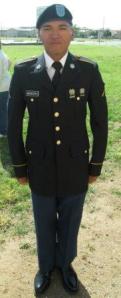
American Samoan Soldier, Chance Meredith
When I picture a Military Base, I picture strict rules and punishments and only enough energy to eat and train. It has always felt like a recipe for loneliness, to me.
However, Meredith, who serves in the US Army Reserves, tells me that while in service of the military, the bonds strengthen as Samoans and other Polynesians reminisce about their upbringings. He says that they talk about “how they overcame the odds and how they suffered to get to where [they’re] at. And it makes them [appreciate] what they have become, unifies them, and makes them fight for the same cause.”
Unity within the ranks is an important factor to success, as well as a load off of the leaders. It also helps to ease the sense of isolation for those serving. To emphasize the idea of unity and family when there are no blood relatives around, Meredith states, “We get together as families when [we’re] off duty. [That’s] all we got when [we’re] off the clock, we usually all get together, play volleyball, and have bbq.”
Although serving in the US Armed Forces is not all fun and games, it’s comforting to know that time exists where they can reflect, connect, and reminisce. As we concluded our conversation, Meredith says, “We all know how Samoans run our families so we run all of our families together so we [don’t] miss home as much, [‘cause] we still need to be there to fight for freedom [and] get gain for our families back home.”
Even though Samoa is only a territory of the US, the patriotism of Samoan Nationals is as strong as any American. In an article for the Samoa News, Aumua Amata says, “Sadly, we have suffered disproportionately greater combat casualties than any other U.S. State or Territory but although I do not have statistics to prove it, I believe American Samoa also provides a disproportionate number of Army enlisted leaders as well.”
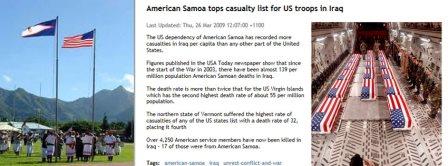
American Samoan casualties
Toa o Samoa means “Warriors/Heroes of Samoa.” The Samoans serving in the US Armed Forces welcome all their fellow soldiers into their circle. As long as there are Samoans (and other Polynesians) serving, others serving will have a brother/sister for life. Your loved ones did not die alone, and those serving are not alone.
Thus, I understand that whether my grandpa died during service or not, he would have been surrounded by people who loved him and would have mourned his death. Sure, he would have missed home and his family, but his enlisted family would have been close. And he would have known he was loved. He would not have been isolated because they would not have allowed it—comes with the Samoan and Polynesian culture, I suppose.
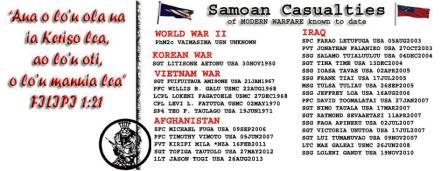
American Samoan Casualties – all wars
So, as we remember those who’ve given their lives in service for the freedom of the US, remember also that they were likely surrounded by friends and loved ones. We are still free in the US—their deaths have not been in vain. Let us honor their sacrifice by making the most of our days we have right now. Tomorrow is not promised, but thanks to our brothers and sisters in service, we have our freedom today.
VIDEO: Polynesian Soldiers singing a Samoan Hymn
Fa’afetai tele lava lo’u aiga Milikeli. Thank you very much my Military family.
J. M. Levi
Aumua Amata’s full article: http://www.samoanews.com/?q=node/74936#sthash.ugVLTroB.dpuf
More on American Samoa Military Bases: http://amsamoa.net/military-bases
Samoans, WWII, and Military Work: http://scholarspace.manoa.hawaii.edu/bitstream/handle/10125/15564/OP36-173-179.pdf?sequence=1
Respect to a few of our fallen Toa o Samoa:
U.S. Army 1st Lt. Jason Asotama Atuatasi Togi: http://www.samoanews.com/node/77650
U.S. Air Force Staff Sgt. Robert ‘Danny’ Hollister: http://www.samoanews.com/content/en/fallen-toa-o-samoa-staff-sgt-hollister-honored
About Jerrica
My name is Jerrica M. Levi and I am married to Mark Levi, who is training to be a supervisor at Subway in Laie. I am Afakasi (half-Samoan) and a member of the Church of Jesus Christ of Latter-Day Saints from Missouri. In April 2014, I received a Bachelor of Arts degree in English, minor in Psychology. Now, my professional title is a Part-Time Instructor for the English Department at Brigham Young University-Hawaii teaching English 101.
I suffer from Post-Traumatic Stress Disorder (PTSD) and hope to become a strong and professional beacon for others who struggle with likewise symptoms. Life is tough, but bit by bit, we can make it through. Keep your head high and do not be ashamed of your healing tears.
Achievements
-Graduated with a 3.6 GPA -2014 Woman of the Year for National Association of Professional Women
-Initiated member of the Sigma Tau Delta: International English Honor Society (Alpha Beta Delta Chapter) -Nationally Certified Level 3 CRLA English Tutor
Publications:
“How It Feels to be Artistic Me.” Kula Manu. (2014): 10-12. Brigham Young University-Hawaii. Print. “Locks of Love.” Kula Manu. (2014): 60-66. Brigham Young University-Hawaii. Print. “Valentine? Gimme a Break.” Ke Alaka’i. 106.6 (2014): 18. Brigham Young University-Hawaii. Print. “For What It’s Worth.” Kula Manu. (2013): 88-90. Brigham Young University-Hawaii. Print.

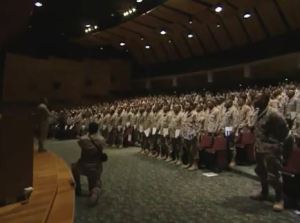
Your article was amazing. Thank you for writing it. May GOD Bless all who have served honorably.
Thank you for informing us about the Tao o Samoans even going back to WWll. Thank you for your service as well.
Those that wrote the article intro, please change the work afatasi to afakasi! Thank you if you can.
Great article. Thank you. Young people today enjoy the great life they have in America but they need to know what makes it possible for them to have that great life. They need to know about the ultimate sacrifices men and women did and they also need to know that there are men and women who are serving our country today so they and all of us can continue to be free and enjoy life with our loved ones, families, friends, church, and every day living. We can pray in our homes to God to watch over our soldiers and their families. It is a simple way of saying “thank you” for our freedom. Grateful to your grandpa and all those who have served and all those who are serving.